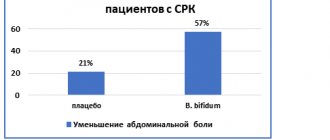Nutrition and lifestyle are important, but only provoking factors. And then standard treatment from a gastroenterologist helps only for a while , until the next exacerbation. A completely different result if the nervous system finally “remembered” the digestive tract. Your own digestive control system is restored and the need for constant treatment gradually disappears. The nervous system here is not only the cause of the disease, but also a convenient treatment tool.
- Often problems with the gastrointestinal tract begin with a disorder of the nervous system
- What does the effect of nervous tension on digestion look like in practice?
- Psychotherapy and hypnosis - treatment whose results are always with you
- What and how we treat. How to contact the Clinic
- More about diseases
Often problems with the gastrointestinal tract begin with a disorder of the nervous system
Here is a typical situation: two people eat the same thing, but one is completely healthy, and the other has a duodenal ulcer and Helicobacter pylori infection. Why is that? It turns out that diseases of the digestive system almost always begin with a nervous disorder.
The famous pathophysiologist Hans Selye created long-term stressful nervous tension in healthy rats in various ways and always received ulcers of the digestive tract . Roughly speaking, the nervous system simply “forgot” to control digestion during stress. This happened under stress of absolutely any nature (mental, temperature, traumatic stress, etc.).
What does the effect of nervous tension on digestion look like in practice?
Even if you don’t feel any particular emotional stress, the lower, evolutionarily ancient parts of the brain may think differently. For some reason, they begin to prepare the body for a physical response to danger. For example, when excited, the heart beats faster, feeding the muscles with blood for fight or flight. During this period, the nervous system does everything to prepare for physical salvation, temporarily postponing such “current affairs” as, for example, managing digestion.
If nervous tension does not come to resolution and resolution, it tends to turn into permanent tension , which leads to disorganization of the control of digestion, blood vessels, immunity and hormone production. Possible symptoms:
- Fatigue and nervousness: You become exhausted from constant stimulation by stress hormones;
- Vegetative-vascular dystonia , sweating or dry skin (errors in controlling vascular tone and thermoregulation);
- Sleep disorders (stress hormones wake you up at night);
- Digestive disorders (the nervous system simply has no time for it). These can be constipation, diarrhea, indigestion, inflammatory processes in any part of the gastrointestinal tract and disturbances in the composition of the intestinal microflora.
Standard diagnoses in these cases: irritable bowel syndrome , chronic gastroduodenitis, biliary dyskinesia, peptic ulcer.
Psychotherapy and hypnosis - treatment whose results are always with you
The nervous system is the manager that controls the digestive process, from the secretion of saliva to the excretion of feces. The walls of the stomach, intestines and digestive glands are literally permeated with nerve endings and plexuses. The release (or non-release) of bile, acid and enzymes, pain, cramps, constipation, diarrhea, the formation of ulcers - all this happens at will or with the participation of the nervous system.
Our digestive system can function fully only in conditions of emotional and physical peace. This means that when further nervous tension is useless, it needs to be “turned off.” The skill of “switching off” with the transition to a state of real rest can be formed by you in the process of psychotherapy, during hypnosis . Our goal is not only to cure, but also to teach, then the result of treatment will be sustainable over time.
When the processes of excitation and inhibition in the nervous system are balanced, the natural rhythms of sleep and wakefulness are preserved, the transition from a tense state to a relaxed one easily occurs, then the gastrointestinal tract works without interruptions.
Psychotherapist. Treatment of irritable bowel syndrome at the Echinacea clinic
The effect of stress on the gastrointestinal tract.
People's tolerance to stress varies greatly. Strong exposure to stress produces psychosomatic reactions only if the body cannot respond adequately to a specific stress factor.
Stress occurs for a variety of reasons - as a result of family problems, job loss, separation from a loved one, death of a loved one, divorce, infidelity - all this leads to severe stress. All the troubles and rush work can also be the cause of the development of digestive psychosomatics - peptic ulcers of the stomach and duodenum; irritable bowel syndrome is also known - IBS, which torments patients with frequent diarrhea, indigestion, and abdominal pain. But stress does not always lead to gastrointestinal diseases.
The strength of the stress factor can be great, and the person copes. But only for a limited time - then, to continue resisting troubles and facing serious problems, you need serious rest and recovery. Often a person does not have time to notice this fatigue, or there are no conditions to rest.
To cope with stress, a supportive environment and a favorable environment in relationships with friends and family members are very important.
WHY DOES STRESS CAUSE DIGESTIVE ORGANS?
When a person is faced with a sudden onset of problems, the glands produce stress hormones, the heart “fills with blood” - a readiness to fight appears. The stomach and intestines, and the entire digestive system, seem to turn off; it has no time to digest food; the body is faced with a more important task of self-preservation, for which a person must attack or run away.
If we are talking about an animal, then after a fight it rests. A person, depending on his character, may unconsciously continue to fight after a fight, especially after an unsuccessful fight.
Factors associated with stress are sleep disturbances - insomnia, cycle of thoughts, restless sleep with awakenings, nightmares.
If the duration of the stress factor exceeds the body's resources, then nervous exhaustion, increased sweating, a feeling of weakness, the so-called chronic fatigue syndrome, occur, and chronic diseases worsen.
Gastritis - inflammation of the gastric mucosa - is a very common disease associated with psychosomatic causes, manifested by pain in the stomach and digestive disorders. With prolonged stress, the blood supply and functions of the gastric mucosa are disrupted, immunity decreases and the regeneration of mucosal cells, which work in difficult conditions - acid and enzymes, deteriorates. Gastritis is a witness to stress.
PUD and DU - gastric and duodenal ulcers are a more serious lesion of the mucous membrane and underlying tissues, in which a wound is formed that is not covered with mucosal cells that are protected from acid and enzymes. The ulcer is accompanied by Helicobacter pylori infection; this is a very common microbe; with normal immunity and the absence of distress, its development is unlikely.
Biliary dyskinesia is a disturbance in the movement of bile through the channels from the gallbladder to the duodenum. The movement is regulated by sphincters and peristalsis of the gallbladder - these reactions are not controlled by consciousness and are disrupted in anxious and stressful conditions.
Irritable bowel syndrome . Its cause is a violation of blood supply, peristalsis and microflora - due to stress and mental overload, overwork.
Digestive psychosomatics associated with inflammation of the gastric mucosa - gastritis, gastrointestinal tract and ulcer, IBS - require psychotherapy, special psychotherapeutic methods of self-regulation, and sometimes the use of drugs that can be prescribed by a psychotherapist.
PSYCHOTHERAPY FOR PSYCHOSOMATIC GASTROINTESTINAL DISEASES.
Psychotherapy for psychosomatics of the stomach and intestines consists of turning off the stress mode of the body - digesting food normally, restoring the mucous membrane of the stomach and intestines, healthy microflora - this can only be done at rest, and not under tension.
Psychotherapy techniques include hypnosis, autogenic training, training and development of coping strategies.
The main attention should be paid to identifying all the stress factors that have an impact. Stress from dysfunctional relationships in the family, from conflicts at work. Internal conflicts are also stressful, especially if a person cannot make an important decision for a long time.
Techniques of psychological self-regulation are special training and exercises in order to reduce the body’s response to stress.
Yoga, oriental holistic arts, martial arts, and breathing exercises are of great benefit in tuning the body to the right anti-stress wave.
WHEN YOU SHOULD CONSULT A PSYCHOTHERAPIST FOR DISEASES OF THE STOMACH AND INTESTINES
1. You have been treated by a gastroenterologist for a long time and there are no results - in stressful situations the ulcer and colitis return
2. You feel that psychosomatic diseases of the stomach and intestines are your experiences and stress, but you don’t understand which ones and don’t know how to cope with them
3. If, along with stomach and intestinal symptoms - pain, indigestion, indigestion, you feel tired or tense, poor sleep or insomnia, depressed mood.
Prepared by psychologist Lyutomskaya V.R.
What and how we treat
Our task is to help you in any accessible and safe way. Psychotherapy (hypnosis) is an obligatory component of therapy, and psychotherapists and gastroenterologists are specialists carrying out the treatment process.
How many hypnosis sessions are needed? Usually the first results can be seen after the first or second sessions. The general course averages 7 sessions 1-2 times a week.
Do you need a gastroenterologist? If digestion is impaired, there is an active inflammatory process, stomach or duodenal ulcers, a gastroenterologist is definitely needed.
More information about some diseases
- Gastritis or inflammation of the stomach lining. This is the earliest disorder in the digestive system. Under normal conditions, the mucous membrane is protected by the immune system. In people experiencing constant nervous stress, emotional stress or regular lack of sleep, the immune system is weakened and digestion is impaired, so in almost 100% of cases they suffer from gastritis.
- Peptic ulcer is a more severe lesion of the gastrointestinal tract. The disease occurs when nervous tension is not resolved for a long time. The process is further aggravated by the fact that, against a background of stress, Helicobacter pylori infection escapes the control of the immune system. This microorganism is involved in the appearance of stomach and duodenal ulcers.
- Irritable bowel syndrome (IBS) is characterized by abdominal pain due to cramping, gas, constipation or diarrhea. Since in IBS the nervous system does not properly control motility, enzyme secretion and the daily rhythm of the intestines, these symptoms are accompanied by a disturbance in the composition of the intestinal microflora. After all, the inhabitants of the intestines need certain living conditions. And these conditions during nervous overstrain are far from ideal.
- Biliary dyskinesia (BD) is associated with a violation of the regime of bile release into the digestive tract. In this case, bile is released untimely and not in physiological quantities, therefore it is not sufficiently involved in digestion. Because of this, intestinal diseases are possible. Spasms of the bile ducts can cause pain in the upper abdomen.
- Duodeno-gastric reflux and Gastroesophageal reflux disease (GERD) are the reflux of bile into the stomach and acidic gastric contents into the esophagus. Normally, there should be no movement of contents up the digestive tract. Bile and acid damage the mucous membranes of the stomach and esophagus, which can be accompanied by heartburn, belching and pain.
The connection between stress and gastritis
28.04.2021
Our body's digestive system is easily affected by difficult emotional situations. Although each person may experience this effect differently, the relationship between these two problems does not change.
It is best to seek medical help if stress and gastritis . The main problem is that many people are not even aware of this problem. Because whenever you feel stressed, you may not understand the symptoms. Sometimes you might think that this is a simple and not so severe stress. However, if you constantly experience this situation, your stomach .
The body and mind are not two different mechanisms that work separately. Everything that happens to one of them affects the other. The digestive system is the system that experiences and directly detects the relationship between these two mechanisms. For this reason, he is very sensitive to difficult situations that people face.
Symptoms
Gastritis is a persistent and painful problem in the upper part of the stomach . It is usually caused by a number of bacteria that cause changes in intestinal flora. As a result, the digestion process is negatively affected. Currently, there is a type of gastritis caused by anxiety, stress or tension caused by a certain situation.
Therefore, if stress and gastritis are experienced at the same time, there are some symptoms that will help us understand this situation. Knowing about these symptoms, it is important to take timely measures. Because delays in such cases can lead to more serious problems.
Among the most obvious symptoms of stress and gastritis are:
- acid in the stomach : it is known as one of the main symptoms indicating the presence of stress and gastritis ;
- Abdominal pain Abdominal pain is common . These pains become more frequent and intense;
- bloating and nausea . _ The abdomen feels warmer and swollen than usual. Sometimes vomiting is also observed;
- neck and shoulder pain : these symptoms indicate severe stress. The muscles in this area are stretched and pain is often felt;
- skin problems and hair loss: these are also symptoms of very long-term stress. The most common problem is acne . In addition, rashes and similar problems may be seen;
- sadness and anxiety: these problems are some of the important symptoms of both stress and gastritis . A person's mood is no longer the same as before. dizzy , weak and restless for no apparent reason
- sleep problems and irritability: as in the previous symptom, with stress and gastritis , sleep problems and irritability or one of them occur. If you encounter one of them, another problem will arise;
- eating disorders: a person either begins to eat too much or experiences a severe loss of appetite. Both conditions cause digestive problems. In everyday worries, the stomach begins to play a leading role.
Nervous gastritis
In cases where stress and gastritis occur simultaneously, we can talk about a condition called “nervous gastritis.” In any case, such a case must be diagnosed by a doctor . So jumping straight to the conclusion is the wrong behavior. If your stomach continues to cause frequent stomach discomfort despite being careful about what you eat and drink, it's time to consult your doctor .
Treatment for nervous gastritis is similar to treatment for other types of gastritis . The most important difference is that the psychological component must be taken into account. From a physical point of view , healthy eating comes to the fore. In addition, you need to get enough rest, sleeping at least seven hours a day. It is important to eat lean foods, fruits and vegetables and drink plenty of fluids.
From an emotional standpoint , go to therapy . Because in this way it will be possible to determine the main cause of concern. Sometimes we may encounter a specific problem that has not yet been identified. Sometimes the problem may lie deeper and can only be identified through good psychological intervention.
When faced with this problem, the main recommendations are to exercise and work on relaxation techniques. These measures will help both physically and emotionally. These practices are useful for regulating digestion and relieving muscle tension. Likewise, it will be possible to get more oxygen to the brain and achieve better psychological balance.
The most important detail is that these measures are taken on time. If you wait too long, the disease can become chronic and have consequences that cannot be prevented.
Published in Gastroentorology Premium Clinic









